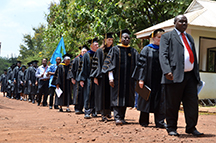March 7, 2016
Purdue commencement opens doors to medicinal future in Africa
 |
|
Twenty-two graduates participate in a commencement ceremony on Feb. 27 in Tanzania, Africa. The graduates earned Master of Science in Technology Leadership and Innovation degrees in the event, the first Purdue commencement in Africa. (Photo/Purdue Polytechnic Institute) |
WEST LAFAYETTE, Ind. —Nothing was unusual when graduate students stepped up to receive their Purdue University degrees on Feb. 27, with everything from the black tassels and diplomas to the university banner at the commencement.
The location, however, was not West Lafayette, Indiana. Instead, the ceremony was more than 8,000 miles away at the Kilimanjaro School of Pharmacy in Tanzania, Africa.
In the first Purdue commencement staged in Africa, 22 students received their Master of Science in Technology Leadership and Innovation in Moshi, Tanzania. The degree, with a concentration in biotechnology innovation and regulatory science (BIRS), is offered through the Purdue Polytechnic Institute and its Center for Professional Studies.
Steve Byrn, Purdue’s Charles B. Jordan Professor of Medicinal Chemistry and co-director of the educational program, said the students - who hail mainly from Nigeria, Kenya, Uganda and Tanzania - are leaders in the African regulatory industry.
“These people, collectively, are critical to solving the issue of providing quality medicines in Africa,” Byrn said. “They won’t be able to change everything, but without them, we have no chance.”
 |
|
Graduate Abigail Ekeigwe gives the response from the class at the end of the first Purdue University commencement ceremony on Feb. 27 in Tanzania, Africa. She and other graduates plan to fly to West Lafayette to attend the on-campus commencement ceremony at Purdue in May. (Photo/Purdue Polytechnic Institute) |
Byrn traveled to east Africa in 2007 after learning of the need from Sister Zita Ekeocha.
She described the program as the fulfillment of a dream after her search for help led her to Purdue University.
“During my search, I discovered that tertiary institutions had no curriculum to teach these courses in Africa,” she said. “Hence, the design of the the program with national drug regulators, pharmacy industries and academics all in the same class taking the courses.
“To my greatest amazement, the seed of the idea has metamorphosed to this masters BIRS,” Ekeocha said.
Since 2007, Byrn has taught students each spring break at the pharmacy school. The program was initiated as a certification course under the coordination of professors at Purdue and Howard universities and gradually evolved to the degree course students graduated from in February.
President Mitch Daniels and Purdue Polytechnic Dean Gary Bertoline were unable to attend the ceremony, but each wrote a letter to the graduates, both of which were read aloud at the ceremony. Each graduate also received copies of the letters.
A few of the graduates, mostly from Nigeria, plan to attend the Purdue commencement in May.
Abigail Adimabua Ekeigwe was among the graduates. As chief regulatory officer in the Central Drug Control Laboratory of Nigeria’s National Agency for Food and Drugs Administration and Control, she has worked in the regulatory field for 16 years.
“I had gone through a Bachelor of Pharmacy degree program and even a master’s program but was not exposed to the wealth of knowledge I got from this program,” she said. “I have not only acquired knowledge, but also have acquired practical wisdom on how to implement the knowledge.”
Kari Clase, program co-director and an associate professor of technology leadership and innovation, noted at least half of the students are women. She said there is more to the program than just providing a classroom for the students
“They are going to impact East Africa as they develop and implement quality management systems to provide better health to their continent,” she said. “Their work will help ensure that quality medicine is available in Africa, which is not always the case now.”
The program emphasizes a blend of hands-on learning and current technology in its teaching. Partners, including Merck Foundation, provided funding and coordinated a scientist-in-kind program to help teach courses.
Byrn and Clase both attended the ceremony and took the opportunity to teach first-year students who will graduate in 2017. Geanie Umberger, a clinical professor of technology leadership and innovation and associate dean for engagement in the Purdue Polytechnic Institute, also attended the commencement on Daniels’ behalf.
Muhammad Lukwago, regional inspector of drugs/lead GMP inspector for the National Drug Authority in Uganda, said the leadership aspect of the program was inspiring.
“I have been awakened to very many realities about leadership and how to be a change agent,” he said. “I strongly believe that I will use my skills and create a positive influence in my organization that will facilitate positive change and transform medicines regulation in Uganda.”
Change is sought for more than just the medicinal situation in Africa. The long-term plans are for the program to become a collaboration and be turned over to leaders there. Clase said work could then begin on a Ph.D. program that would follow the same model.
Ekeigwe likes Purdue’s long-term plan, saying knowledge is power.
“It is time for Africans to rise up and produce quality medicines for Africans and to achieve self-sufficiency doing so,” she said. “Africans have to be empowered with knowledge and skills that will help them achieve this.”
Writer: Brian L. Huchel, 765-494-2084, bhuchel@purdue.edu
Sources: Steve Byrn, 765-714-2808, sbyrn@purdue.edu
Kari Clase, 765-494-4649, klclase@purdue.edu
Related Web sites:
Purdue Polytechnic Institute Flickr Page: https://www.flickr.com/photos/techpurdue/albums/72157665429677301

